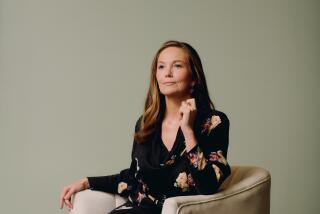Cleese Uses Humor to Explain Our Faces
- Share via
As one of the members of Monty Python’s Flying Circus, the legendary English comedy troupe, John Cleese is the master of silly walks, and also the star of such inspired bits of lunacy as “A Fish Called Wanda” and the current farce “Rat Race.” And now the lanky 61-year-old is trying his hand at the documentary genre in “The Human Face With John Cleese.” The four-hour series can be seen Sunday and Monday on the Learning Channel.
Although Cleese interviews several scientists, as well as people afflicted with facial deformities in “Human Face,” he also brings a lot of his trademark crazy humor to the proceedings. Cleese is joined by Elizabeth Hurley and fellow Python veteran Michael Palin for several comedic sketches exploring how the 44 muscles and two bones of the human face actually shape every aspect of our lives, including health, happiness, social status, sex life and success.
Cleese also interviews Candice Bergen, Pierce Brosnan, Joan Rivers and Sir David Attenborough. Cleese admits that he had to stand his ground frequently during the production of the series because he and the BBC didn’t see eye to eye on the project.
Cleese and psychologist Brian Bates also have published a companion book, “The Human Face” (DK Publishing and the BBC). The actor discussed “The Human Face” in his West Hollywood hotel suite during a recent visit.
Question: How did you tackle the concept of beauty, which has to be one of the fundamentals when dealing with an examination of the human face?
Answer: The disadvantage of beauty is often that people who are very, very beautiful are often total [jerks] because everything has come to them without any effort and they become very vain and they get terrified of losing their looks because, a, they have always relied on their looks, and b, they never developed other sides of their personality.
Q: Just as Candice Bergen says in her interview, they are devoid of personality.
A: Wasn’t she terrific? I could have done a whole program with Candice. I found it so interesting [when she talked about] what it was like when she ceased to be very, very sexually attractive [because of her age]. I think she’s astoundingly attractive, but when she talks about when she got older falling off the radar screen when she walked into a room and there wasn’t a ripple of sexual interest.
That was the part of the program that meant the most to me--there are a lot of freebies you get when you are beautiful and you come to rely on them and then you panic when you lose your looks and then you want to have plastic surgery and it all gets very sad .
Q: People’s appearances often change so radically after plastic surgery.
A: That’s right. I have seen at least three photographs of very well-known people--I don’t want to say their names--in the last month and I was horrified because they obviously had plastic surgery. They are all men and it’s quite clearly gone wrong. There is one very well-known Englishman who was actually looking like a woman. .
The one thing I think you can have done are your eyes. I have had my eyes done about five years ago. Q: Why did you choose the face as a documentary subject?
A: The BBC approached me. The truth is at some stage I do want to do a series on what religion might be like if the churches hadn’t [got involved]. I don’t think I’ll ever get to do it because I don’t think any television company will let me and that was the conclusion I came to during the course of this. What I learned about working at the BBC is that there is much more control now in a sense ... than there used to be at the BBC. I am quite sure now that “Monty Python” would not happen at the BBC. They said things to me and to my agent I found profoundly depressing, like the audiences are not interested in insights. The head of the science department [at the BBC] told my agent, ‘I don’t think John really understands our audience.’ But what he meant was the BBC-wide audience isn’t intelligent and John shouldn’t be aiming the stuff at that level, to which I wanted to reply, ‘Why didn’t you tell me that when you came to me with the idea of the series, because I wouldn’t have done it.’ There is no question they are dumbing down, though they will get upset and deny it.”
“The Human Face With John Cleese” can be seen Sunday and Monday at 9 p.m. and midnight on the Learning Channel; it repeats Saturday at 4 p.m.
More to Read
The complete guide to home viewing
Get Screen Gab for everything about the TV shows and streaming movies everyone’s talking about.
You may occasionally receive promotional content from the Los Angeles Times.







